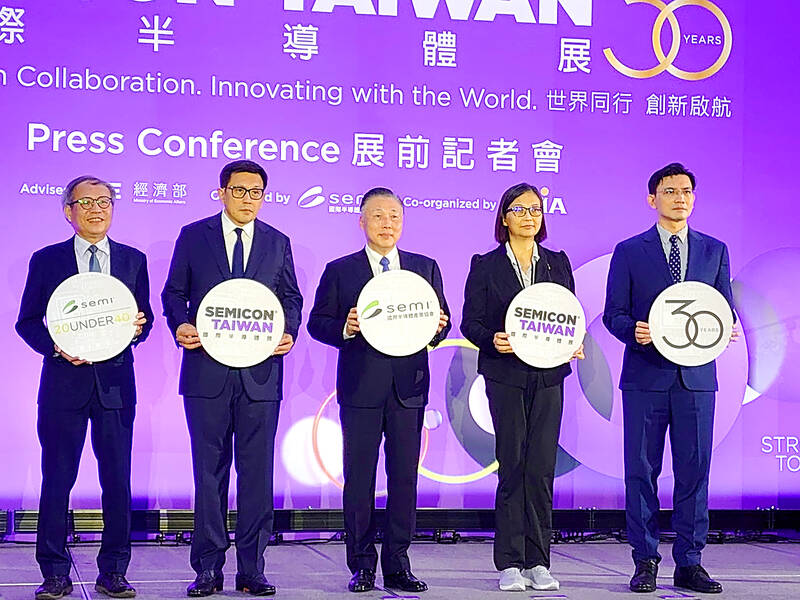Global semiconductor industry association SEMI plans to join forces with global partners in creating a new energy management platform in Taiwan to tackle power consumption and heat dissipation issues faced by artificial intelligence (AI) applications, SEMI international board chairman Tien Wu (吳田玉) said yesterday at a news conference promoting this year’s Semicon Taiwan trade show.
The new platform would be SEMI’s third industry alliance in Taiwan. It created the chip-on-wafer-on-substrate (CoWoS) alliance two years ago and the silicon photonics industry alliance last year.
Taiwanese companies should continue investing selectively and strategically to capture next-wave industry growth opportunities amid a major shift in the value chain, in addition to overcoming short-term advanced technology capacity constraints amid the AI boom, Wu said.

Photo: CNA
They should invest in key areas such as factory automation, silicon photonics, and CoWoS and power management technologies in preparation for new AI applications and to leverage their current strength, he said.
Taiwan Semiconductor Manufacturing Co (台積電) vice president of integrated interconnect and packaging business C.K. Hsu (徐國晉) said that the advanced CoWoS packaging technology has become the most sought after technology by local semiconductor and equipment suppliers, while demand for silicon photonics technology would become robust, as the technology helps advance AI networking in data centers.
The most important values of silicon photonics technology are power efficiency, and the integration of bandwidth and signal, he added.
However, as power consumption grows along with increases in transistor count, how to efficiently transmit power to specific areas on a chip would become a structural bottleneck, Wu said, adding that Taiwan should work with global partners to tackle such issues.
Taiwan has been benefiting from the booming demand for AI applications, as it has built an extensive AI ecosystem from chip manufacturing, chip design to hardware manufacturing, Wu said.
That competitive position is expected remain in place for the next two to three years, he added.
At the news conference, GlobalWafers Co (環球晶圓) chairwoman Doris Hsu (徐秀蘭) said that the availability of key materials such as rare earths and rare specialty gases used in the semiconductor manufacturing process would become a new bottleneck.
That is on top of the availability of advanced 1-nanometer or 2-nanometer chip capacity or advanced chip packaging capacity, Hsu added.
“In addition to capacity and technology races, the next checkpoint should be the control of key materials in the future. Key materials will become crucial in enhancing supply resilience,” she said.
Hsu called on the government to play its part in bolstering key materials availability by encouraging local production.

AI BOOST: Although Taiwan’s reliance on Chinese rare earth elements is limited, it could face indirect impacts from supply issues and price volatility, an economist said DBS Bank Ltd (星展銀行) has sharply raised its forecast for Taiwan’s economic growth this year to 5.6 percent, citing stronger-than-expected exports and investment linked to artificial intelligence (AI), as it said that the current momentum could peak soon. The acceleration of the global AI race has fueled a surge in Taiwan’s AI-related capital spending and exports of information and communications technology (ICT) products, which have been key drivers of growth this year. “We have revised our GDP forecast for Taiwan upward to 5.6 percent from 4 percent, an upgrade that mainly reflects stronger-than-expected AI-related exports and investment in the third

Mercuries Life Insurance Co (三商美邦人壽) shares surged to a seven-month high this week after local media reported that E.Sun Financial Holding Co (玉山金控) had outbid CTBC Financial Holding Co (中信金控) in the financially strained insurer’s ongoing sale process. Shares of the mid-sized life insurer climbed 5.8 percent this week to NT$6.72, extending a nearly 18 percent rally over the past month, as investors bet on the likelihood of an impending takeover. The final round of bidding closed on Thursday, marking a critical step in the 32-year-old insurer’s search for a buyer after years of struggling to meet capital adequacy requirements. Local media reports

TECHNOLOGICAL RIVALRY: The artificial intelligence chip competition among multiple players would likely intensify over the next two years, a Quanta official said Quanta Computer Inc (廣達), which makes servers and laptops on a contract basis, yesterday said its shipments of artificial intelligence (AI) servers powered by Nvidia Corp’s GB300 chips have increased steadily since last month, should surpass those of the GB200 models this quarter. The production of GB300 servers has gone much more smoothly than that of the GB200, with shipments projected to increase sharply next month, Quanta executive vice president Mike Yang (楊麒令) said on the sidelines of a technology forum in Taipei. While orders for GB200 servers gradually decrease, the production transition between the two server models has been

ASE Technology Holding Co (日月光投控), the world’s largest integrated circuit (IC) packaging and testing supplier, yesterday announced a strategic collaboration with Analog Devices Inc (ADI), coupled with the signing of a binding memorandum of understanding. Under the agreement, ASE intends to purchase 100 percent shares of Analog Devices Sdn Bhd and acquire its manufacturing facility in Penang, Malaysia, a press release showed. The ADI Penang facility is located in the prime industrial hub of Bayan Lepas, with an area of over 680,000 square feet, it said. In addition, the two sides intend to enter into a long-term supply agreement for ASE to